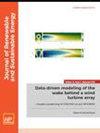现代配电系统的机器学习:进展与展望
IF 1.9
4区 工程技术
Q4 ENERGY & FUELS
引用次数: 0
摘要
机器学习(ML)在电力和能源系统(PES)中的应用正在以惊人的速度进行研究,这导致了最近大量的文献补充。随着电力系统基础设施的发展,在PES中部署ML技术的兴趣也在增加。然而,尽管人们越来越感兴趣,但报告的真实世界应用数量有限,这表明研究和实践之间的差距尚未完全弥合。为了帮助强调可以缩小这一差距的领域,本文讨论了为现代电力系统开发和调整ML技术的挑战和机遇,特别关注配电系统。这些系统在转变电力部门和适应新兴分布式技术方面发挥着至关重要的作用,以减轻气候变化的影响,加快向可持续能源未来的过渡。本文的目的不是对文献中的最新技术进行详尽的概述,而是让具有工程或计算机科学背景并对PES的ML领域感兴趣的读者能够了解这个主题,从而鼓励在这个快速发展的领域进行跨学科研究。为此,本文讨论了ML为解决配电系统面临的不断变化的运营挑战做出贡献的方式,并确定了相关的应用领域,这些领域体现了ML在近期做出贡献的潜力。同时,讨论了在配电系统中实际实现ML的关键考虑因素,并对几个潜在的未来方向提出了建议。本文章由计算机程序翻译,如有差异,请以英文原文为准。
Machine learning for modern power distribution systems: Progress and perspectives
The application of machine learning (ML) to power and energy systems (PES) is being researched at an astounding rate, resulting in a significant number of recent additions to the literature. As the infrastructure of electric power systems evolves, so does interest in deploying ML techniques to PES. However, despite growing interest, the limited number of reported real-world applications suggests that the gap between research and practice is yet to be fully bridged. To help highlight areas where this gap could be narrowed, this article discusses the challenges and opportunities in developing and adapting ML techniques for modern electric power systems, with a particular focus on power distribution systems. These systems play a crucial role in transforming the electric power sector and accommodating emerging distributed technologies to mitigate the impacts of climate change and accelerate the transition to a sustainable energy future. The objective of this article is not to provide an exhaustive overview of the state-of-the-art in the literature, but rather to make the topic accessible to readers with an engineering or computer science background and an interest in the field of ML for PES, thereby encouraging cross-disciplinary research in this rapidly developing field. To this end, the article discusses the ways in which ML can contribute to addressing the evolving operational challenges facing power distribution systems and identifies relevant application areas that exemplify the potential for ML to make near-term contributions. At the same time, key considerations for the practical implementation of ML in power distribution systems are discussed, along with suggestions for several potential future directions.
求助全文
通过发布文献求助,成功后即可免费获取论文全文。
去求助
来源期刊

Journal of Renewable and Sustainable Energy
ENERGY & FUELS-ENERGY & FUELS
CiteScore
4.30
自引率
12.00%
发文量
122
审稿时长
4.2 months
期刊介绍:
The Journal of Renewable and Sustainable Energy (JRSE) is an interdisciplinary, peer-reviewed journal covering all areas of renewable and sustainable energy relevant to the physical science and engineering communities. The interdisciplinary approach of the publication ensures that the editors draw from researchers worldwide in a diverse range of fields.
Topics covered include:
Renewable energy economics and policy
Renewable energy resource assessment
Solar energy: photovoltaics, solar thermal energy, solar energy for fuels
Wind energy: wind farms, rotors and blades, on- and offshore wind conditions, aerodynamics, fluid dynamics
Bioenergy: biofuels, biomass conversion, artificial photosynthesis
Distributed energy generation: rooftop PV, distributed fuel cells, distributed wind, micro-hydrogen power generation
Power distribution & systems modeling: power electronics and controls, smart grid
Energy efficient buildings: smart windows, PV, wind, power management
Energy conversion: flexoelectric, piezoelectric, thermoelectric, other technologies
Energy storage: batteries, supercapacitors, hydrogen storage, other fuels
Fuel cells: proton exchange membrane cells, solid oxide cells, hybrid fuel cells, other
Marine and hydroelectric energy: dams, tides, waves, other
Transportation: alternative vehicle technologies, plug-in technologies, other
Geothermal energy
 求助内容:
求助内容: 应助结果提醒方式:
应助结果提醒方式:


